REC Overview
Core Leader
Odessa Addison, DPT, PhD
Phone: 410-706-4543
Email: oaddison@som.umaryland.edu
Overview
The purpose of the Research Education Core (REC) is to support the development of junior faculty from multiple disciplines as they pursue careers as scientists with a focus on the restoration of function among older adults with impairments and on the prevention or delay of progression in those who are already disabled. The REC supports Scholars and affiliated faculty (who are former Scholars or junior faculty with career development awards related to our mission) in mentor-based research training and other career development activities in a supportive research environment.
The UM-OAIC has a successful history of mentored training that crosses traditional disciplinary boundaries to develop novel research for improving function and independence in older persons. This has enriched the cadre of scientists at UM and elsewhere conducting aging research in exercise and rehabilitation science.
The specific aims of the REC are to:
Recruit, Select, Support and Retain REC Scholars and Affiliated Faculty
Identify, select, and support promising junior faculty from diverse backgrounds and prepare them to be independent investigators. This is accomplished by:
- Recruiting talented junior faculty whose research goals are congruent with the UM-OAIC goals and
- Ensuring up to 3 years of support for the REC Scholars through departmental commitment to protected time with salary support, salary support from the UM-OAIC, access to research resources, and REC Scholar project funds.
Train REC Scholars and Affiliated Faculty
Through mentored research projects and individualized training plans which use the resources of the UM-OAIC, the national OAIC network and other NIA supported programs. This is accomplished by:
- Providing a structured Faculty Development Plan (FDP) to guide and measure the Scholar's progress.
- Provide a multidisciplinary team approach for individual and group mentoring to REC Scholars and affiliated faculty.
- Provide a training environment that creates a supportive research community while allowing for individualized training.
Creation of a Leadership Academy
Develop a Leadership Academy which will teach leadership skills and provide leadership experience for promising junior and mid-level scientists with demonstrated commitment and expertise to become the next leaders, in the UM-OAIC and nationally, in research aimed at improving function in older adults.
Evaluate the Activities of the REC
This is being achieved by an evaluation team that measures the short term and long-term successes of the REC aims using established quantitative and qualitative metrics, informal focus groups and individual meetings to track the needs and accomplishments of scholars, success of our trainees and meetings to provide feedback to REC scholars, other trainees, mentors and UM-OAIC leadership and advisory committees.
The REC's comprehensive research training program has developed junior scholars trained with skills at the bench and in the conduct of clinical research, posed to translate clinical problems into mechanistic studies, and laboratory findings into clinical application in the elderly. This is why our scholars are so successful in the receipt of federal career development awards (NIH Ks and VA CDAs), and subsequent independent research funding and academic promotion.
2025-2026 REC Seminars
|
Topic and Zoom link |
Speaker |
Date |
|
Aging Research Funding Opportunities- Panel Discussion Join Here: |
Jason Falvey, DPT, PhD |
Thurs. Sept. 11th @ 4pm |
|
Communicating Effectively with NIH Program Officer and Grants Manager: Keys to a Successful Relationship Join Here: |
Odessa Addison, DPT, PhD |
Thurs. Oct. 9th @ 4pm |
|
Networking Social |
Odessa Addison, DPT, PhD |
Thurs. Dec. 4th |
|
Understanding the NIH Review, including new simplified criteria Join Here: |
Stephen Seliger, MD, MS |
Thurs. Feb. 5th @ 4pm |
|
Maximizing Attendance at OAIC National Meeting |
Odessa Addison, DPT, PhD |
Thurs. April 23rd @ 4pm |
|
OAIC Annual Meeting: |
OAIC Coordinating Center |
May 7&8, 2026 |
|
UM-OAIC External Advisory Board Meeting: In person event |
|
TBD ~May 2026 |
Funding Opportunities
Funding Opportunities
Micro-Funds
The Center is excited to offer the opportunity for Pepper Center pilot investigators and junior scholars, as well as Pepper Center affiliates who are interested in applying for a pilot or junior scholar position in the future, to apply for micro-funds ranging from $500-$2,000 for a current project that relates to the Pepper Center theme. There is no deadline to apply; funds are available on an as-needed basis.
Learn More: Micro-Funding
For More Information
Contact Anne Sullens
Current REC Scholars
Current REC Scholars

L. Leigh Smith, MD, MAS
Assistant Professor, Department of Epidemiology and Public Health
University of Maryland, School of Medicine
llsmith@som.umaryland.edu
Funded Scholar 2025-2027
Research Areas of Interest: infection control and prevention, health equity, multi-drug resistant organisms, nursing facilities, candida auris
REC Project Title: "C. auris in Nursing Facilities"
.png)
Julie Rekant, DPT, PhD
Assistant Professor, Department of Physical Therapy and Rehabilitation Science
University of Maryland, School of Medicine
jurekant@som.umaryland.edu
Funded Scholar 2025-2027
Research Areas of Interest: wearables, aging, physical activity, mobility, exercise
REC Project Title: "Targeted Exercise aNd HeAlth promotion or fall prevention in older adults with sarCopenia and obEsity (ENHANCE)"
.jpg)
Danielle Powell, AuD, PhD
Assistant Professor, Department of Hearing and Speech Sciences
University of Maryland, College of Behavioral and Social Sciences
dspowell@umd.edu
Funded Scholar 2025-2027
Research Areas of Interest: wearables, aging, physical activity, mobility, exercise
REC Project Title: "Improving Access to Hearing Education and Care for Older Adults"
Past REC Scholars
Past REC Scholars
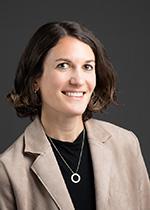
Brittany Burch, PhD, RN
Assistant Professor, Department of Organizational Systems and Adult Health
University of Maryland, School of Nursing
bdrazich@umaryland.edu
Funded Scholar 2024-2026
Research Areas of Interest: physical activity, physical function, virtual-reality, exergaming
REC Project Title: "Preserving Ability through Virtual Exercise (PAVE)"

Stephanie Jo, MD, PhD
Adjunct Assistant Professor, Department of Biochemistry and Molecular Biology
University of Maryland, School of Medicine
Funded Scholar 2023-2025
stephanie.jo@som.umaryland.edu
Research Areas of Interest: osteoarthritis, AI, MRI, muscuoloskeletal
REC Project Title: "Identification of high-risk prognostic factors of osteoarthritis based on single nucleotide polymorphism and MRI morphometry utilizing the Osteoarthritis Initiative database"
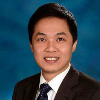
Sui-Seng Tee, PhD
Assistant Professor, Department of Diagnostic Radiology and Nuclear Medicine
University of Maryland, School of Medicine
Funded Scholar 2023-2025
stee@som.umaryland.edu
Research Areas of Interest: metabolism, MRI
REC Project Title: "Metabolic Imaging as a Biomarker of Muscle Aging"
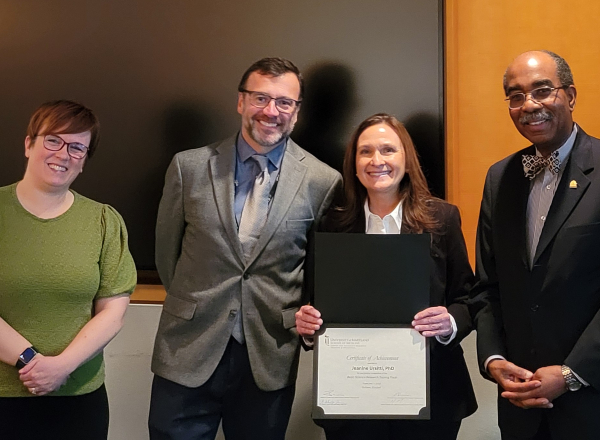
Jeanine Ursitti, PhD
Assistant Professor, Department of Orthopaedics
University of Maryland, School of Medicine
Funded Scholar 2021-2024
Research Areas of Interest: Membrane Cytoskeleton, Cardiovascular Disease, Hypertension
REC Project Title: "Cell Mechanisms as a Biomarker of Osteo-Sarcopenia"
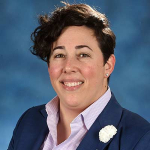
Andrea Levine, MD
Funded Scholar 2022-2024
Research Areas of Interest: ARDS, COVID-19, Post-COVID Conditions, Post-ICU Syndrome (PICS), ECMO
REC Project Title: "The Longevity of ARDS Inflammatory Subphenotypes and their Role in Predicting Functional Recovery in Older Adults"
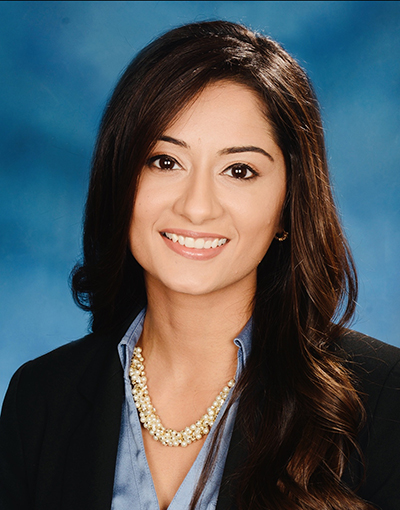
Sarasijhaa Desikan, MD
Associate Professor, Department of Surgery
University of Maryland, School of Medicine
Funded Scholar 2020-2023
Research Areas of Interest: Carotid Artery Stenosis, Aortic Aneurysms, Dialysis Access, Peripheral Arterial Disease, Venous Disease, Vascular Trauma
REC Project Title: "Asymptomatic Carotid Stenosis: Cognitive and Mobility Function after Exercise"
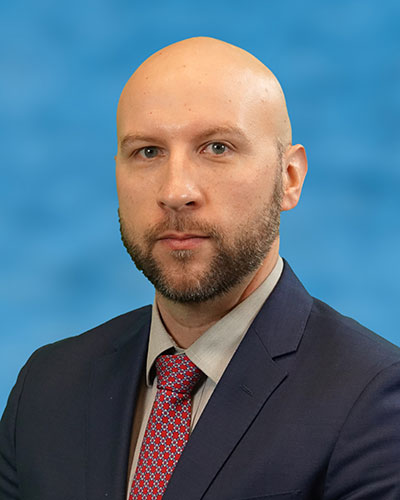
Jason Falvey, DPT, PhD
Associate Professor, Department of Physical Therapy and Rehabilitation Science
University of Maryland, School of Medicine
Funded Scholar 2021-2021
Research Areas of Interest: Rehabilitation Epidemiology, Rehabilitation Health Services Research, Home Health Care, Disability, Older Adults
REC Project Title: " Neighborhood Environments and Disability after Disabling Hospitalizations"
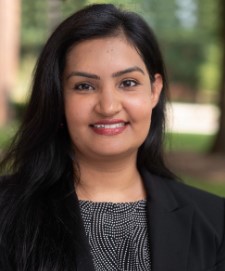
Tasneem Khambaty, PhD
Associate Professor, Department of Psychology
University of Maryland Baltimore County
Funded Scholar 2018-2021
Research Areas of Interest: Psychosocial risk factors and racial/ethnic disparities in the prevention of cardiometabolic disease; aging research and the identification of early vulnerabilities to cognitive and functional decline; cognitive-behavioral and technology-based intervention.
REC Project Title:"Depressive Symptoms, Executive Function, and Trajectories of Diabetes Biomarkers: Relations to Functional Status and Race-Related Disparities in the HANDLS study"
The REC Scholar position was an extremely valuable opportunity for an early career investigator like me. The scholar award provided time, funding, collaborations, mentorship, a national and local scientific community, and professional development resources that have yielded a burgeoning and fulfilling program of research at the intersection of Behavioral Medicine and Aging. I continue to benefit now from Pepper Center involvement, through the collaborations and community built during the Scholar award period. —Tasneem Khambaty
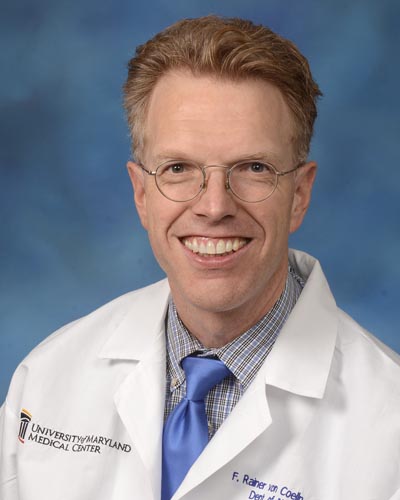
F. Rainer von Coelln, DrMed
Assistant Professor, Department of Neurology
University of Maryland, School of Medicine
Funded Scholar 2017-2020
Research Areas of Interest: Quantitative phenotyping in Parkinsons disease using measureable sensors, with a focus on gait and balance analysis and genotype -phenotype analysis
REC Project Title: "Towards Next-Generation Phenotyping in Parkinson Disease: Quantitative Analysis of Gait and Balance Using a Portable Biosensor Device"
The pilot funding I received from the UM-OAIC Pepper Center has been incredibly helpful for me to get my research on gait and balance in Parkinson disease started, when other funding seemed out of reach. This funding for my Pepper pilot project allowed me to collect preliminary data that I was then able to use for NIH grant applications. Furthermore, for the kind of longitudinal study I pursued, it was really critically important to have some continuous support for several years. With a Junior Scholar award that picked up where the pilot project left off, the Pepper Center provided just that. I am truly grateful and impressed with this commitment to funding me over an extended period of time in an early stage of my career. Equally important, the resource cores of the Pepper Center offer support in all critically important aspects of the kind of clinical research I do, namely biostatistics, applied physiology and rehab technologies. My project would not have been possible without this wonderful support from the Pepper Center. —F. Rainer von Coelln
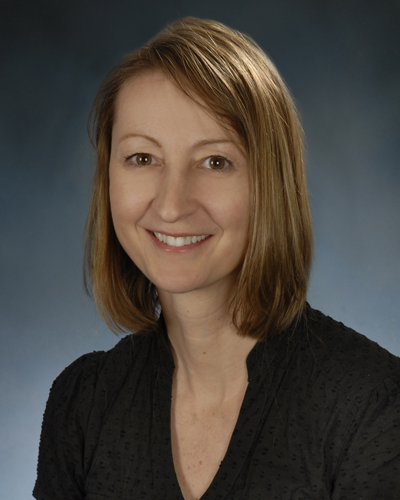
Vicki Gray, MPT, PhD
Associate Professor, Department of Physical Therapy and Rehabilitation Science
University of Maryland, School of Medicine
Funded Scholar 2017-2018
Research Areas of Interest: Stroke, aging, asymptomatic carotid stenosis, postural control, balance, falls, exercise interventions, electromyography
REC Project Title: "Motor control strategies during stepping and postural control in stroke”
As a former REC scholar, the experience to conduct research and learn to work effectively in a cross disciplinary team has been an excellent and valuable experience for my career. —Vicki Gray
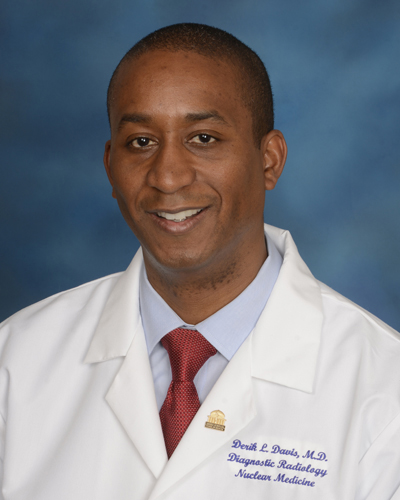
Derik Davis, MD
Professor, Department of Diagnostic Radiology and Nuclear Medicine
University of Maryland, School of Medicine
Funded Scholar 2015-2018
Research Areas of Interest: Shoulder and Upper Extremity Dysfunction, Skeletal Muscle Quality and Sarcopenia, Aging, Clinical History for Imaging Examinations, Musculoskeletal Trauma, Sports Medicine, Bone and Soft Tissue Tumors
REC Project Title: "Shoulder Pain, Rotator Cuff Tear, Coordination, and Mobility in Aging”
My time as a REC scholar was a tremendous opportunity for professional growth. I learned skills necessary to start a journey toward becoming an independent investigator, while receiving valuable advice from top-notch mentors along the way. —Derik Davis
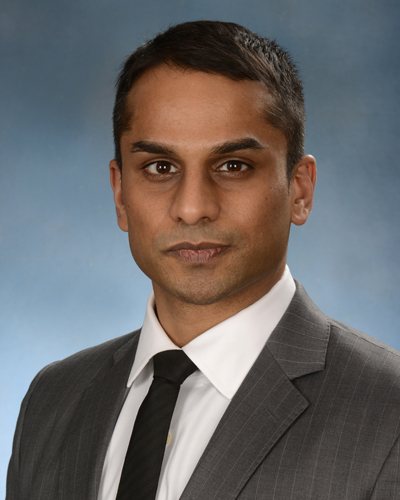
Rishi Kundi, MD
Associate Professor, Department of Surgery
University of Maryland, School of Medicine
Funded Scholar 2014-2017
Research Areas of Interest: The functional benefits of adjunctive therapy in older adults with peripheral vascular disease
REC Project Title: "Functional Benefit of Exercise Therapy after Endovascular Intervention in Older Patients with PAD”
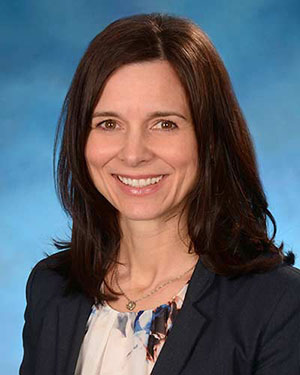
Kelly Westlake, PhD, MSc, PT
Professor, Department of Physical Therapy and Rehabilitation Science
University of Maryland, School of Medicine
Funded Scholar 2014-2017
Research Areas of Interest: Rehabilitation, Stroke, Balance, Falls, Motor Learning, Upper Extremity, Cognition, Neuroimaging
REC Project Title: "Cognitive and Neural Underpinnings of Protective Arm Responses to Balance Perturbations in Older Adults”
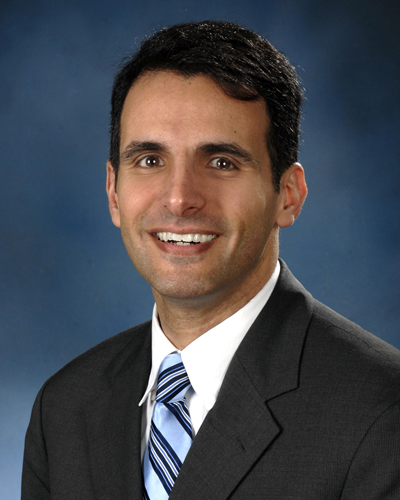
Michael Dimyan, MD
Funded Scholar 2012-2015
Research Areas of Interest: Neurorehabilitation, Neurophysiology, Neuroimaging, Spasticity Management
REC Project Title: "Investigating Brain Network Interactions in Stroke and Aging Using Concurrent Transcranial Magnetic Stimulation and Functional MRI"
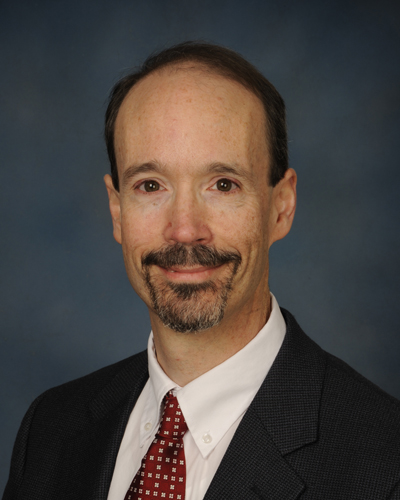
Doug Savin, MPT, PhD
Funded Scholar 2011-2014
Research Areas of Interest: Motor Control, Balance, Posture, Falls, Stroke, Gait Adaptation
REC Project Title: "Comparison of Reactive Step Training and Voluntary Task-Oriented Training to Induce Neuromotor Changes for Improving Balance and Preventing Falls"
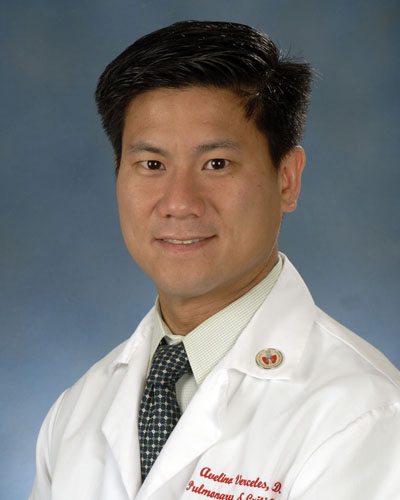
Avelino Verceles, MD
Professor, Department of Medicine
University of Maryland, School of Medicine
Funded Scholar 2011-2014
Research Areas of Interest: role of physical rehabilitation and nutritional optimization in improving outcomes of older survivors of critical illness
REC Project Title: "Development of a Rehabilitation Strengthening and Mobility Program for Ventilator Dependent Older Patients“
